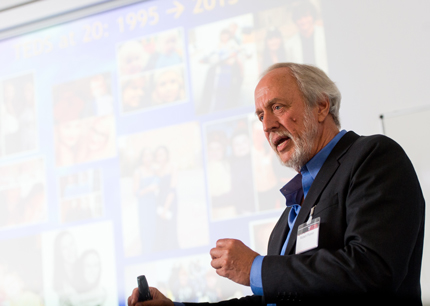Transforming the nature-nurture zeitgeist – 20 years of TEDS
Thanks to 20,700 UK twins, scientists using cutting-edge research in psychology, psychiatry and genetics have been able to unpick the complex relationship between nature and nurture, transforming the way we think about genetic and environmental influences on diverse areas of behavioural development.
The Twins Early Development Study (TEDS) based at the Institute of Psychiatry, Psychology & Neuroscience (IoPPN), King’s College London, celebrated 20 years of ground-breaking scientific discovery at an event which explored the genesis of TEDS, its key achievements to date and its future direction.
Early collaborators Dr Bonny Oliver and Professor Philip Dale opened the event, describing the birth of TEDS and its humble beginnings, before introducing Thalia Eley, Professor of Developmental Behavioural Genetics and Deputy Director of TEDS.
Professor Eley praised the ‘remarkable tenacity’ of TEDS collaborators and the ‘amazing teamwork that has epitomised the project from the outset.’
‘One of the most important things TEDS has done is to examine the role of genetic and environmental factors on educational outcomes. It has led to numerous discoveries, ranging from providing evidence for the first time of genetic influences on educational outcomes, to publishing the first genome-wide analysis of anxiety traits’, said Professor Eley.
She added: ‘The rich data we have and our relationship with these families both contribute to make TEDS incredibly special.
‘It’s fairly rare to have 20 years worth of data on any population, but to have this length and breadth of data on twins and their families, from earliest childhood into adulthood, is truly unique.’
Robert Plomin (pictured below), Professor of Behavioural Genetics and Director of TEDS, acknowledged the study’s major impact in ‘changing the zeitgeist in terms of nature and nurture, moving the whole discussion closer to a balanced view.’

He thanked members of the ‘TEDS family’ for their contributions to the success of the project, including the twins themselves, IoPPN students and research collaborators from King’s and beyond, and showed how TEDS researchers have gone on to groundbreaking research elsewhere.
Professor Plomin thanked the Medical Research Council (MRC) for their 20 years of support for TEDS and recognised the crucial backing provided by the MRC Social, Genetic & Developmental Psychiatry (SGDP) Centre, the project’s home at King’s. He acknowledged SGDP directors past and present, including founder Professor Sir Michael Rutter, Professor Peter McGuffin and current director Professor Francesca Happé, for their support.
Attendees later viewed a video produced by filmmaker David Martin, which goes behind the scenes of TEDS and shares some of the project’s key findings.
Set up in 1995 by Professor Plomin, Professor Judy Dunn and Professor Sir Michael Rutter, TEDS is one of the world’s leading studies of how genes and environments shape our development from birth to young adulthood. TEDS research suggests that all psychological traits show significant and substantial genetic influence – but that none are 100 per cent heritable.
To date more than 300 research papers have been published using TEDS data, in collaboration with over 50 institutions worldwide.
The pioneering project has garnered important insights into genetic influences on maths and reading ability, intelligence and autism. Thanks to TEDS, it is now known that around half of the genes that influence how well a child can read also play a role in mathematics ability. In addition, more than half of the differences in students’ GCSE scores are now thought to be due to genetics.
It was also recently discovered, using TEDS data, that autism spectrum disorder (ASD) is more heritable than previously thought, with genetic influences on the disorder estimated to be around 80 per cent.
Recent developments in molecular genetics technology mean that TEDS can now start to identify which particular genes play a part in influencing various psychological traits. It is hoped that this research could be used to help individuals tackle some of the challenges they face growing up, by better informing parents, teachers, policy makers, the general public and the individuals themselves.
Notes to editors
For further media information please contact Jack Stonebridge, Press Officer, Institute of Psychiatry, Psychology & Neuroscience, King’s College London jack.stonebridge@kcl.ac.uk/ (+44) 020 7848 5377.
For more information about TEDS visit their website.